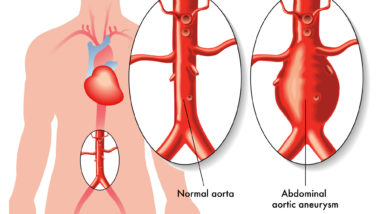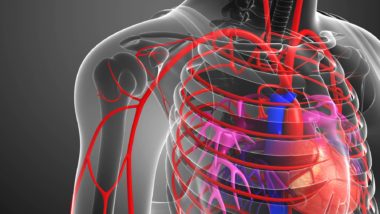Top Class Actions’s website and social media posts use affiliate links. If you make a purchase using such links, we may receive a commission, but it will not result in any additional charges to you. Please review our Affiliate Link Disclosure for more information.

Unfortunately, an increasing number of individuals taking fluoroquinolone antibiotics could be at risk of developing an aortic aneurysm. An abdominal aortic aneurysm is an enlarged area in the lower portion of the body’s aorta. The aorta is the primary blood vessel that transports blood and supplies it throughout the body. An aortic aneurysm growing from the abdominal area might require careful waiting or even emergency surgery.
What Are Aortic Aneurysm Symptoms?
Spotting an aortic aneurysm requires being knowledgeable about the symptoms. According to the Mayo Clinic, as an abdominal aortic aneurysm gets bigger, some people may notice back pain, a deep and consistent pain in the abdomen or on the side of the abdomen, or a pulsating feeling that occurs near the navel. Other symptoms include low blood pressure, sweatiness, clamminess, nausea, vomiting and pain that radiates to the legs or back.
The back pain or abdominal pain typically associated with this condition has been described as a tearing sensation. Any severe back or abdominal pain should be reported to a medical professional immediately, as this could indicate a life-threatening event. Any patient who is having an aortic aneurysm should take this situation seriously.
Risk factors for aortic aneurysm include tobacco use, high blood pressure, and atherosclerosis. Recent information from the FDA suggests treatment with a certain class of antibiotics may be a contributing risk factor.
Antibiotics have come under fire in recent years because some in the medical community believe they are prescribed too often. Furthermore, the reliance on antibiotics to treat a broad range of infections means that many patients are exposed to these medicines over the course of a given year.
The first boxed warning was added to fluoroquinolone antibiotics in July 2008 because of the heightened risk of tendon rupture and tendonitis. In 2016 the Food and Drug Administration another black box warning for fluoroquinolones due to reports of mental health effects and blood sugar disturbances.
The risk of developing aortic dissection or aortic aneurysm is serious for those patients who have used fluoroquinolone antibiotics, such as Avalox or Cipro. Researchers believe that antibiotics known as fluoroquinolones may somehow damage collagen. Collagen is a building block for many parts of the body, including tendons and blood vessels.
A study found that patients who took fluoroquinolones recently were twice as likely to experience aortic aneurysm. That study included more than 1.7 million patients, aged 65 and above, and was published in BMJ Open. The study identified that within one month of completing a treatment course, those patients who used fluoroquinolone antibiotics to treat an infection were 2.2 times more likely to sustain aortic aneurysm side effects.
With the risk of developing conditions like aortic dissection, the popularity of antibiotics can be problematic for patients who are not aware of the side effects of taking fluoroquinolones. Patients are encouraged to consult their healthcare provider if they experience symptoms linked to aortic dissection or aortic aneurysm.
Join a Fluoroquinolone Aortic Aneurysm, Aortic Dissection Lawsuit Investigation
If you or a loved one were prescribed Fluoroquinolones such as Cipro, Levaquin or Avelox and were later diagnosed with an aortic dissection or aortic aneurysm, you may have a legal claim. Fill out the form on this page now for a FREE case evaluation or call 1-(855)-JONES-LAW (1-855-566-3752).
ATTORNEY ADVERTISING
Top Class Actions is a Proud Member of the American Bar Association
LEGAL INFORMATION IS NOT LEGAL ADVICE
Top Class Actions Legal Statement
©2008 – 2024 Top Class Actions® LLC
Various Trademarks held by their respective owners
This website is not intended for viewing or usage by European Union citizens.
Get Help – It’s Free
Join a Fluoroquinolone Aortic Aneurysm, Aortic Dissection Lawsuit Investigation
If you qualify, an attorney will contact you to discuss the details of your potential case at no charge to you.
PLEASE NOTE: If you want to participate in this investigation, it is imperative that you reply to the law firm if they call or email you. Failing to do so may result in you not getting signed up as a client or getting you dropped as a client.
E-mail any problems with this form to:
Questions@TopClassActions.com.
Oops! We could not locate your form.












